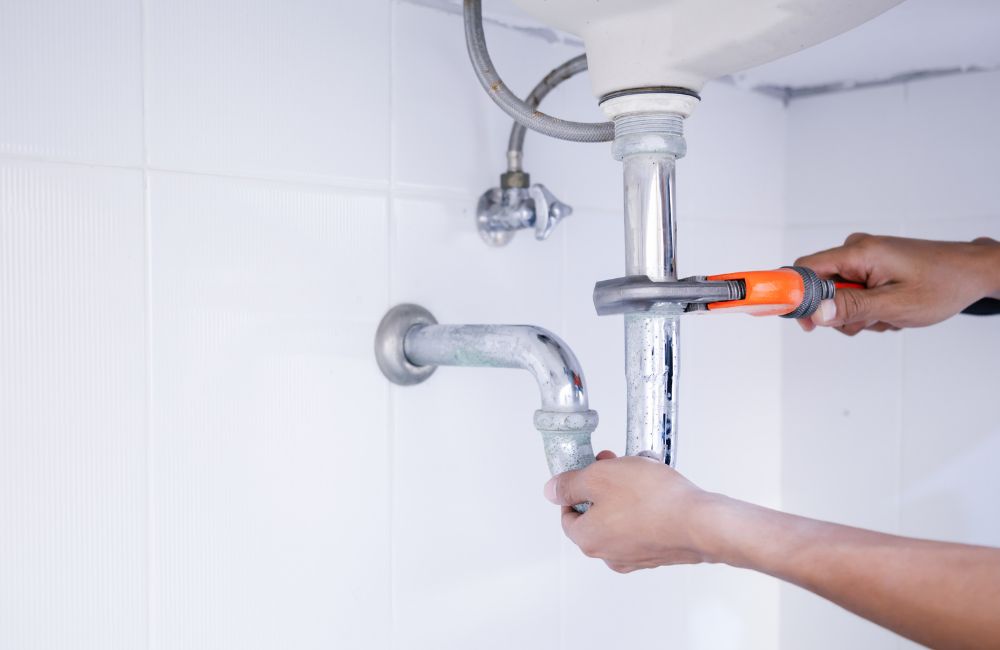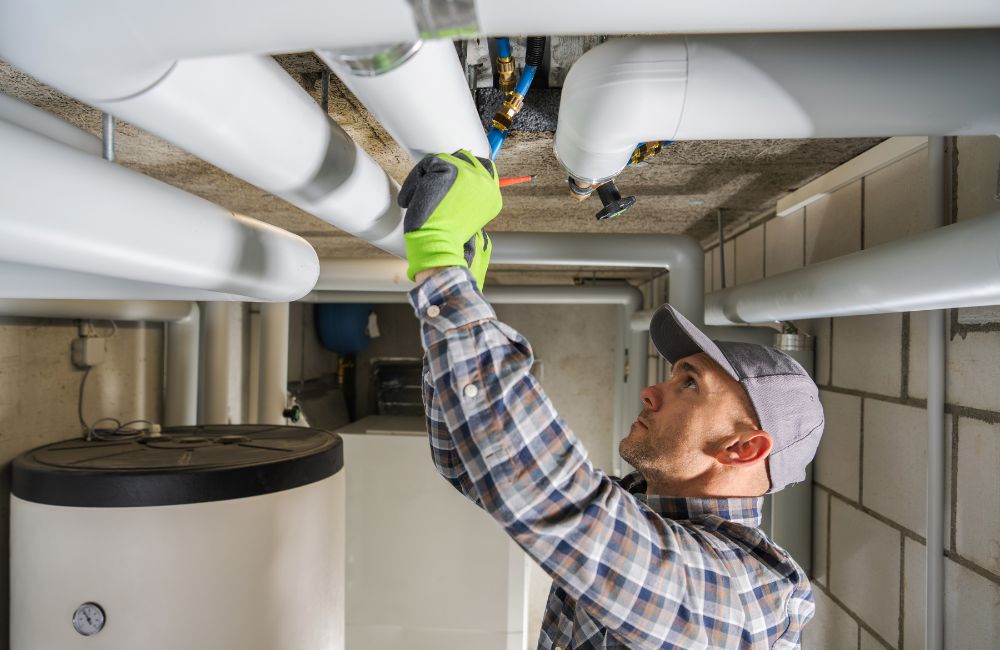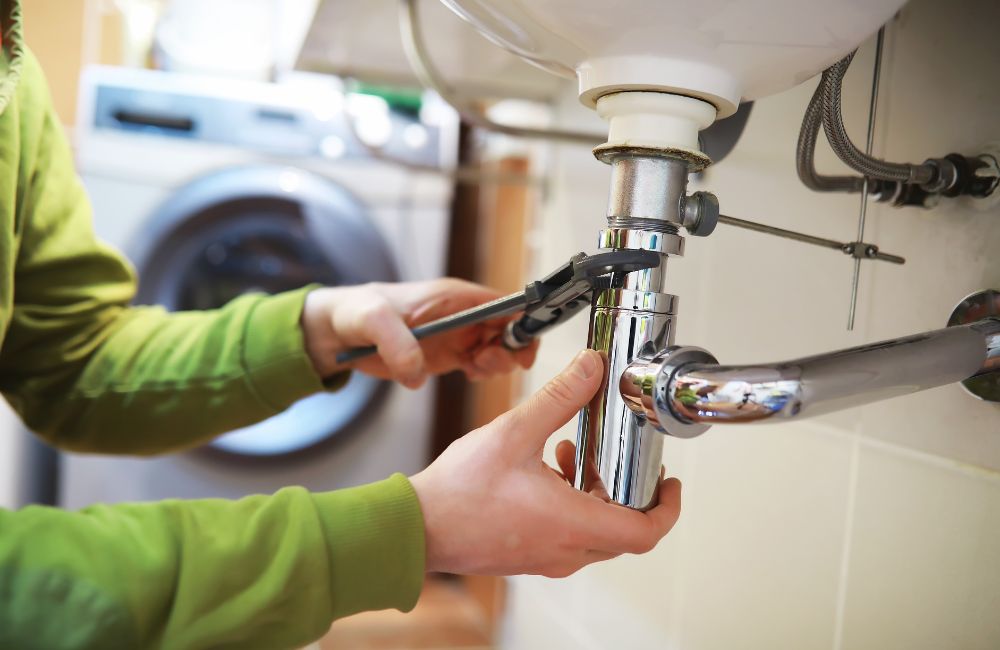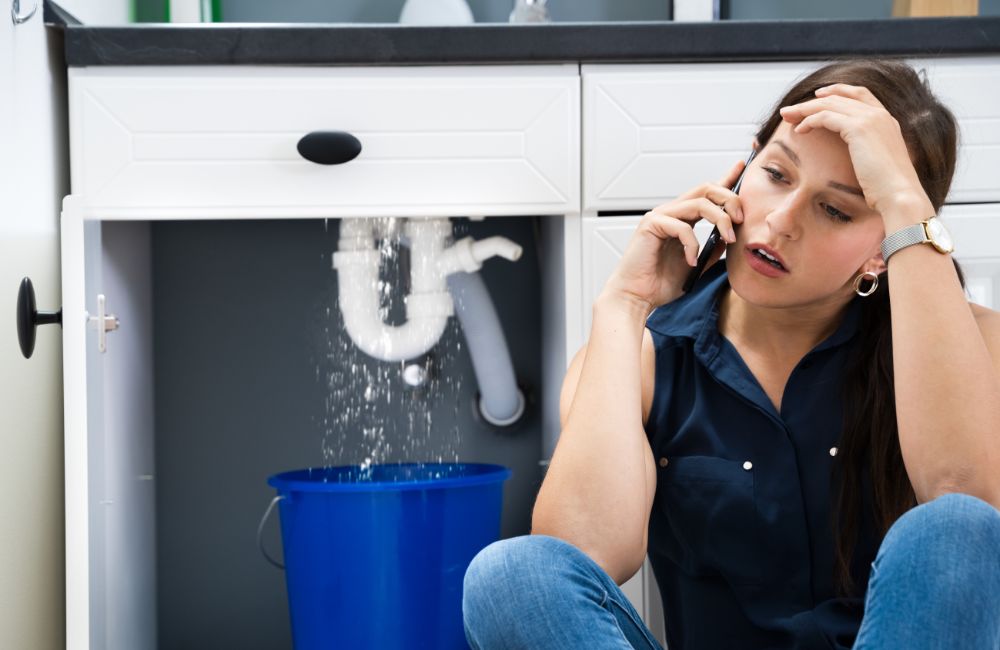Maintaining a healthy plumbing system is crucial for any homeowner. Unfortunately, plumbing issues can arise unexpectedly, causing inconvenience and potentially leading to costly repairs. In these situations, the expertise of local plumbers becomes invaluable. With 130,348 plumbing companies operating in the United States, their services are essential in preventing and addressing common plumbing problems.
Here 12 common plumbing issues and how local plumbers near you help avoid them.
Table of Contents
Key Takeaways
What Are the Common Signs of Plumbing Problems?
12 Common Plumbing Problems and How Local Plumbers Avoid Them
1. Dripping Faucets
2. Leaky Pipes
3. Running Toilets
4. Low Water Pressure
5. Clogged Drains
6. Sump Pump Failure
7. Water Heater Issues
8. Sewer System Backup
9. Jammed Garbage Disposal
10. Leaking Hose Bibb
11. Faulty Water Pressure Regulator
12. Backed-Up Shower Drains
What Are the Benefits of Regular Plumbing Maintenance?
How to Choose the Right Local Plumber
Frequently Asked Questions
Act Now: Secure Your Home’s Plumbing with L&P Plumbing
| Key Takeaways ✔ Identifying slow drains, water stains, unpleasant odors, low water pressure, and noisy pipes early can prevent minor issues from becoming major problems. ✔ Regular inspections, using quality parts, and timely repairs can prevent significant water wastage caused by dripping faucets. ✔ Routine checks, proper pipe insulation, and maintaining optimal water pressure can prevent extensive damage from leaky pipes. ✔ Regular maintenance, quality parts, and professional installation help avoid running toilets and water wastage. ✔ Regular pipe cleaning, leak detection, and addressing municipal supply issues can maintain adequate water pressure. ✔ Installing drain screens, proper disposal of waste, and regular cleaning can prevent clogged drains and maintain efficient drainage. ✔ Regular testing, keeping the sump pit clean, and having a backup power source can prevent basement flooding due to sump pump failure. ✔ Periodic tank flushing, thermostat adjustment, and replacing faulty heating elements ensure efficient water heater operation. |

What Are the Common Signs of Plumbing Problems?
Before diving into the specific plumbing problems, it’s essential to recognize the warning signs that indicate a plumbing issue. By identifying these signs early, you can prevent minor issues from escalating into major problems. Here are some common indicators of plumbing problems:
- Slow Drains: Slow-draining sinks, showers, or tubs can signal a blockage in the pipes.
- Water Stains: Discolored patches on walls or ceilings indicate potential leaks.
- Unpleasant Odors: Foul smells coming from drains or toilets suggest sewer line issues.
- Low Water Pressure: A sudden drop in water pressure can be a sign of a leak or blockage.
- Noisy Pipes: Banging or gurgling noises from pipes often indicate air in the pipes or a loose connection.
If you notice any of these signs, it’s crucial to contact local plumbers to diagnose and resolve the issue promptly.
12 Common Plumbing Problems and How Local Plumbers Avoid Them
Plumbing issues are a common concern for homeowners, but understanding these problems and knowing how local plumbers in Watertown, CT, can help prevent and fix them can save you time, money, and stress.
- Dripping Faucets
Dripping faucets is one of the most common plumbing issues. They can be caused by worn-out washers, seals, or faulty valve seats. Although a dripping faucet might seem like a minor issue, it can lead to significant water wastage over time.
Prevention Tips from Local Plumbers
- Regular Inspections: Local plumbers conduct regular inspections of faucets to identify any early signs of wear and tear. This proactive approach helps catch problems before they become severe.
- Quality Parts: Using high-quality washers, seals, and valves during installation or repair ensures longevity and reduces the likelihood of leaks. Local plumbers often source these parts from reputable suppliers to guarantee their effectiveness.
- Timely Repairs: Promptly addressing small leaks can prevent them from worsening and causing more significant problems. Local plumbers stress the importance of not ignoring even the smallest drip.
- Leaky Pipes
Leaky pipes can cause extensive damage to your home if left unaddressed. Common causes include corrosion, high water pressure, and temperature fluctuations.
Prevention Tips from Local Plumbers
- Routine Inspections: Routine checks for signs of leaks, such as water stains or damp spots, can help catch issues early. Local plumbers use advanced tools like moisture meters and thermal imaging to detect hidden leaks.
- Pipe Insulation: Insulating pipes, particularly those exposed to cold temperatures, can prevent freezing and subsequent leaks. Local plumbers install high-quality insulation materials to protect your plumbing system.
- Water Pressure Regulation: Installing a pressure regulator can help maintain appropriate water pressure and prevent damage to pipes. Local plumbers can adjust these regulators to the correct settings to ensure optimal performance.
- Running Toilets
A running toilet occurs when water continuously flows into the toilet bowl, even when not in use. This is often caused by a faulty flapper valve or fill valve. A leaking toilet can waste more than 6,000 gallons of water each month..
Prevention Tips from Local Plumbers:
- Regular Maintenance: Periodic inspection of toilet components to ensure they are in good working condition. Local plumbers often recommend setting a maintenance schedule to keep everything running smoothly.
- Quality Parts: Using durable, high-quality parts can reduce the frequency of repairs. Local plumbers source these parts from reliable manufacturers to ensure they last.
- Professional Installation: Ensuring that toilets are installed correctly can prevent issues related to improper setup. Local plumbers have the expertise to install toilets accurately and efficiently.
- Low Water Pressure
Low water pressure can be caused by various factors, including pipe blockages, leaks, or issues with the municipal water supply.
Prevention Tips from Local Plumbers
- Pipe Cleaning: Regularly cleaning pipes and fixtures can prevent buildup that reduces water pressure. Local plumbers in Watertown, CT, use specialized tools to clear blockages and restore normal flow.
- Leak Detection: Identifying and repairing leaks early can prevent them from affecting water pressure. Local plumbers employ advanced leak detection methods, such as acoustic listening devices and infrared cameras.
- Working with Authorities: Working with local water authorities to address any external water supply issues. Local plumbers can coordinate with municipal services to ensure consistent water pressure.
- Clogged Drains
Clogged drains are a common household issue caused by the buildup of hair, soap scum, grease, and other debris in the pipes.
Prevention Tips from Local Plumbers
- Drain Screens: Installing screens can catch debris before it enters the pipes. Local plumbers can recommend and install the best types of drain screens for your home.
- Proper Disposal: Avoiding the disposal of grease and large food particles down the drain. Local plumbers educate homeowners on what should and shouldn’t go down the drain.
- Regular Cleaning: Using natural cleaners like baking soda and vinegar to keep drains clear. Local plumbers can also perform professional cleanings to ensure your drains remain clog-free.

- Sump Pump Failure
A sump pump failure can lead to basement flooding, causing significant damage to your property. Common causes include power outages, clogs, and mechanical failures.
Prevention Tips from Local Plumbers
- Regular Testing: Periodically testing the sump pump to ensure it is in good working condition. Local plumbers can perform these tests and make necessary adjustments.
- Clean Sump Pit: Keeping the pit free of debris to prevent clogs. Local plumbers can clean the sump pit as part of their maintenance services.
- Backup Power: Installing a backup power source to ensure the sump pump operates during power outages. Local plumbers can recommend and install reliable backup systems.
- Water Heater Issues
Water heater problems, such as insufficient hot water or strange noises, can be caused by sediment buildup, faulty heating elements, or thermostat issues.
Prevention Tips from Local Plumbers
- Tank Flushing: Periodically flushing the water heater tank to remove sediment buildup. Local plumbers can perform this service to ensure your water heater operates efficiently.
- Thermostat Adjustment: Regularly checking and adjusting the thermostat settings to ensure proper heating. Local plumbers can set the thermostat to the optimal temperature for your needs.
- Heating Element Replacement: Promptly replacing faulty heating elements to maintain performance. Local plumbers can diagnose and replace heating elements as needed.
- Sewer System Backup
Sewer backups are caused by blockages in the sewer line, often due to tree roots, grease buildup, or non-flushable items.
Prevention Tips from Local Plumbers
- Regular Inspections: Using cameras to inspect sewer lines and identify blockages. Local plumbers have the equipment to conduct thorough sewer line inspections.
- Proper Disposal: Avoiding flushing non-biodegradable items down the toilet. Local plumbers educate homeowners on proper disposal methods to prevent blockages.
- Backwater Valve Installation: Installing a valve to prevent waste from flowing back into the home. Local plumbers can install these valves to protect your home from sewer backups.
- Jammed Garbage Disposal
Garbage disposal jams can occur when fibrous or hard materials, such as bones or fruit pits, are disposed of improperly.
Prevention Tips from Local Plumbers
- Proper Usage: Avoiding the disposal of fibrous or hard materials. Local plumbers can provide guidelines on what should and shouldn’t go into the garbage disposal.
- Regular Cleaning: Using natural cleaners to remove buildup and maintain performance. Local plumbers can perform deep cleanings to ensure your disposal remains clog-free.
- Cold Water Usage: Running cold water while using the disposal to prevent clogs. Local plumbers advise running water for a few seconds before and after using the disposal.
- Leaking Hose Bibb
A leaking hose bibb, or outdoor faucet, is common in colder climates where freezing temperatures can cause the faucet to crack.
Prevention Tips from Local Plumbers
- Frost-Proof Hose Bibbs: Installing hose bibbs designed to withstand freezing temperatures. Local plumbers can recommend and install these frost-proof bibbs.
- Regular Checks: Periodically inspecting for leaks. Local plumbers can include these checks in their routine maintenance visits.
- Winterization: Disconnecting hoses and draining the faucet before winter. Local plumbers can provide winterization services to protect your outdoor faucets.
- Faulty Water Pressure Regulator
A faulty water pressure regulator can cause inconsistent water pressure throughout the home.
Prevention Tips from Local Plumbers
- Regular Monitoring: Checking water pressure periodically. Local plumbers can monitor and adjust water pressure as part of their services.
- Regulator Replacement: Replacing faulty regulators promptly. Local plumbers can identify and replace malfunctioning regulators.
- Professional Calibration: Ensuring the regulator is set to the appropriate pressure. Local plumbers have the expertise to calibrate water pressure regulators correctly.
- Backed-Up Shower Drains
Shower drain backups are often caused by hair and soap scum buildup.
Prevention Tips from Local Plumbers
- Hair Catchers: Installing hair catchers to prevent clogs. Local plumbers can recommend and install the best hair catchers for your shower drains.
- Regular Cleaning: Using natural cleaners to maintain clear drains. Local plumbers can provide professional cleaning services to keep your drains in top condition.
- Avoiding Chemicals: Avoid harsh chemical cleaners that can damage pipes. Local plumbers suggest using natural alternatives to protect your plumbing system.
What Are the Benefits of Regular Plumbing Maintenance?
Regular plumbing maintenance offers numerous benefits, including:
- Cost Savings: By addressing minor issues before they become major problems, homeowners can save on costly repairs.
- Longevity of Plumbing Systems: Regular maintenance extends the life of plumbing fixtures and systems, ensuring they function efficiently for years to come.
- Peace of Mind: Knowing that your plumbing system is in good condition reduces stress and the likelihood of emergencies.
How to Choose the Right Local Plumber
Selecting the right local plumber is crucial for maintaining a healthy plumbing system. Here are some tips to help you make the right choice:
What to Look For
- Certification: Ensure the plumber is certified. This certification indicates they have received the necessary training and education to perform plumbing tasks correctly and safely.
- Experience: Look for a plumber with extensive experience. Experienced local plumbers are likely to have encountered and resolved a wide range of plumbing issues, making them more adept at handling any problems that arise in your home.
- Reputation: Check the plumber’s reputation. A good reputation often reflects reliable and high-quality service. Look for online reviews and ask for recommendations from friends or family.
- Licensing: Verify that the plumber is licensed. Licensing ensures that the plumber has met the required standards set by local authorities and is authorized to perform plumbing services.
- Insurance: Ensure the plumber is insured. Insurance protects both the plumber and you in case of accidents or damages during the plumbing work. This includes liability insurance and worker’s compensation.
- Professionalism: Evaluate the plumber’s professionalism. Professional local plumbers communicate clearly, arrive on time, and respect your property by cleaning up after their work.
Questions to Ask
- Have you handled this type of plumbing problem before?
- What is your approach to diagnosing and fixing plumbing problems?
- Are you available for emergency plumbing services?
- How long do you anticipate this job will take?
- Can you provide a detailed cost estimate and explain your payment options?
- Can you provide references or examples of past work?
- Do you offer any warranties or guarantees on your work?
- Can you provide proof of your licensing and insurance?
- Do you use environmentally friendly practices and materials?
- Do you handle cleanup after the job is completed?
- Do you perform the work yourself or subcontract it out?
- Will you handle necessary permits and ensure compliance with local codes?
Recommendations and Reviews
- Check Online Reviews: Read reviews on platforms like Google, Yelp, and the Better Business Bureau. Online reviews can provide valuable insight into a plumber’s reliability, professionalism, and quality of work from previous customers.
- Get Recommendations from Trusted Sources: Ask friends, family, and neighbors for their recommendations. Personal referrals from people you trust can lead you to plumbers who have consistently provided excellent service.
- Look for Consistent Feedback: Pay attention to recurring themes in the reviews and recommendations. Consistent positive feedback can indicate a plumber’s strong reputation, while repeated negative comments may be a red flag.
- Check Social Media: Review the plumber’s social media pages for additional feedback and interaction. Social media can offer a more informal look at customer experiences and how the plumber engages with their community.
- Professional Associations: Verify membership in professional associations or local business groups. Membership in industry organizations can indicate a plumber’s commitment to maintaining high standards and staying updated with best practices.
- Evaluate Response to Negative Reviews: See how the plumber responds to negative feedback. A professional and constructive response to criticism can demonstrate the plumber’s dedication to customer satisfaction and continuous improvement.
Frequently Asked Questions
How long should plumbing last in a house?
The lifespan of plumbing varies based on the materials used. Copper pipes can last 50-70 years, PVC pipes around 25-40 years, and PEX pipes about 40-50 years. Regular maintenance and timely repairs can help extend the life of your plumbing system. Additionally, water quality and environmental factors can also affect the longevity of plumbing materials.
Why don’t we use copper pipes anymore?
Copper pipes are less commonly used due to their higher cost, susceptibility to corrosion, and the rise of more affordable and flexible alternatives like PEX and PVC pipes. Copper is also prone to theft due to its high resale value. Moreover, installing copper pipes requires more labor and skill, which increases overall costs.
How often do PVC pipes need to be replaced?
PVC pipes typically need to be replaced every 25-40 years. However, proper maintenance can extend their lifespan. Factors like soil conditions and water pressure can also impact their durability. Regular inspections by local plumbers can help identify potential issues before they become severe.
What happens if a toilet is not vented?
If a toilet is not vented, it can cause poor flushing, frequent clogs, and sewer gases to enter your home, leading to unpleasant odors and potential health hazards. Proper venting is essential for maintaining the water seals in traps. This prevents sewer gases from escaping and ensures the plumbing system operates efficiently.
Can a shower and toilet share a vent?
Yes, a shower and toilet can share a vent, but it must be properly sized and installed according to local plumbing codes to ensure adequate ventilation and prevent drainage issues. Shared vents help balance air pressure in the pipes, promoting efficient water flow. Consulting with local plumbers can ensure the venting system is up to code and functions correctly.

Act Now — Secure Your Home’s Plumbing with L&P Plumbing
For residents of Watertown, CT, ensuring your plumbing system is in top condition is crucial. Don’t wait for minor issues to become major problems. With years of experience serving Watertown, CT, L&P Plumbing is dedicated to providing top-notch service and ensuring your home’s plumbing is efficient and problem-free. Trust L&P Plumbing, your local experts in Watertown, CT, for all your plumbing needs.
Call us now to schedule an inspection or service appointment!

